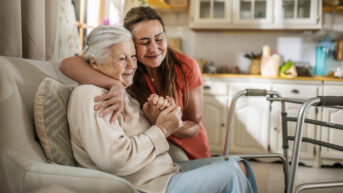Clinically reviewed by Chris Mosunic, PhD, RD, MBA, Chief Clinical Officer, Calm
TL;DR
- 63 million American adults are providing ongoing care to adults or children with a medical condition or disability (family caregivers).
- Family caregiving is associated with stress, anxiety, and feelings of being isolated and trapped. Family caregivers say they need more mental health support.
- Employers and health plans can help fill this gap with digital evidence-based mental health support designed to address the needs of caregivers.
- Calm Health offers evidence-based programs and mindfulness content designed specifically to support caregivers. Through the One Family Foundation’s CareOutLoud campaign, caregivers can access Calm Health resources.
Jenny, a 48-year-old single mother, is one of the roughly 18 million sandwich-generation caregivers in the U.S. quietly navigating a daily maze of complex challenges. Her day begins before sunrise with a shift at the local grocery store, where she helps shoppers find items and complete the self-checkout process. By midday, she’s home tending to the needs of her elderly mother who moved in after suffering a stroke. In the late afternoon, Jenny’s supporting her 12-year-old daughter with dyslexia exercises, patiently reinforcing each word and sound. Her next priority is preparing dinner for the family.
Emotionally, physically, and mentally exhausted by work, elder care, and parenting a child with a disability, Jenny often falls asleep in front of the TV before finally crawling into bed. That’s when financial worries set in and rob her of a good night’s sleep.
More Americans are now family caregivers
Jenny’s story isn’t rare. In fact, according to the 2025 report on caregiving by the AARP and the National Alliance for Caregiving, the number of family caregivers in the U.S. providing support for loved ones with chronic illness or disability has increased nearly 50% since 2015. What’s more,
- Of the 63 million family caregivers in the U.S. (about one in four adults), nearly 30% are sandwich-generation caregivers—caring for both an adult with a medical condition or disability and a child under 18 at home.
- For caregivers under the age of 50, the number of sandwich-generation caregivers rises to 47%.
- Like Jenny, roughly 4 million family caregivers are supporting a child with an illness or disability.
And like Jenny, 61% of family caregivers are women, and 70% are employed. As it becomes harder to secure affordable, quality child care and elder care, employees are taking on the caregiver role at the expense of their health, well-being and work performance. According to the AARP and National Alliance of Caregiving, working caregivers feel more isolated and financially strained.
The U.S. child care and elder care crisis is accelerating
Widespread closures of caregiving facilities, labor shortages, rising caregiving costs, and a rapidly growing elderly population are just some of the factors accelerating the caregiving crisis in the U.S. For instance,
- More than half of American children live in a “child care desert,” an area where there’s either no licensed child care providers for children under the age of five, or there’s less than one slot in a licensed child care center for every three children under age five.
- Nearly 18% of children (>1 in 6) are reported to have a developmental disability, a 38% increase in prevalence since 1997.
- Demand for elder care is expected to rise sharply as the number of Americans living with dementia is expected to more than double, from 6 million today to 14 million by 2050.
- Half of older American parents aren’t getting the help they need with daily activities.
Caregiving is complex, demanding, and often long-term
Without adequate support, caregivers are often left on their own to navigate complex challenges for several hours a week. Family caregivers spend between nearly 24 hours a week to more than 50 hours a week caring for others, the equivalent of more than a full-time job.
Forty percent of caregivers say they assist with high-intensity care, including a wide range of activities for daily living, such as feeding, bathing, preparing meals, and managing finances. Nearly one-third of family caregivers have provided care for five years or more.
Many caregivers struggle with stress and anxiety
The responsibility of caregiving can cause severe mental strain, often because the caregiver feels trapped. More than half (51%) of those caring for parents say it’s one of the most stressful parts of their lives, and 25% of those caring for others say the same.
According to a survey by Arizent/EBN, screenings showed that 30% of caregivers report having moderately or severely elevated levels of anxiety, and 26% have moderately or severely elevated levels of stress. Anger, loneliness, guilt, cognitive overload, and lack of concentration are other common responses to taking on a caregiving role.
Family caregivers need more mental health support from health plans and employers
Caregivers indicate they’re not getting the support they need, with 62% of respondents to the Arizent/EBN survey grading their employer’s support for caregiving a C or worse. Those caring for parents or partners gave employers the lowest grades.
Fewer than 20% of employees said their company offers resources to support them in caregiving, regardless of who they’re caring for. And among those who said their employer offers mental health services, two-thirds of respondents said those services fail to meet their needs.
Calm Health programs support the mental well-being of family caregivers
Calm helps health plans and employers fill the mental health support gap for caregivers with a collection of digital evidence-based programs and a wide array of mindfulness tools. Because the programs are short and accessible anytime, anywhere, caregivers can easily incorporate them into their hectic daily schedules.
Calm Health evidence-based programs for caregivers
Developed by psychologists with deep subject matter expertise, Calm Health programs are based on principles of cognitive behavioral therapy and have an average 4.5 out of 5 user rating, helping boost long-term user engagement.
Calm Health features the following programs for caregivers:
- Caring for Aging Parents with Confidence
This program offers a thoughtful approach to caring for parents without losing oneself. Proven tips include balancing sandwich-generation demands, managing emotional relationships, and fostering resilience. - Support for Mothers & Caregivers
Listeners walk away with practical tools to help them ride the waves and savor the wins of parenting. - Parenting Teens with Mental Health Conditions
A welcoming program with practical tools caregivers can use to support their teen’s mental health and feel more calm and confident as a parent. - Parenting Teens: Growing & Changing Together
This program provides practical tools and revealing insights to help parents better understand and connect with their changing teen. - Anxiety 2.0: Next Level Tools for Anxiety
This program helps listeners explore what’s behind their anxiety and gives them the tools to challenge it, build resilience, and thrive with it.
Calm Health mindfulness content and tools to support caregivers
In addition to programs, it’s important to offer mindfulness tools that caregivers can use when feeling stressed, anxious, lonely or overwhelmed. Calm Health offers meditations and wisdom sessions under 10 minutes designed specifically to address the needs of caregivers. Caregivers also can find an extensive library of soundscapes, music, and Sleep Stories to support them when they’re struggling to get high-quality sleep.
Calm joins the CareOutLoud campaign to reach more caregivers
To bring Calm Health resources to more caregivers, Calm is excited to participate in the One Family Foundation’s CareOutLoud campaign. The Care Out Loud campaign aims to make caregiving more visible, supported, and emotionally sustainable. As a campaign partner, Calm provides free one-year access to Calm Health resources, including guided meditations, content to support people with stress and anxiety, and caregiver-specific programs designed to build resilience and emotional balance.
Health plans and employers play a vital role in supporting the needs of caregivers
As the caregiving crisis grows, health plans and employers can play a pivotal role in easing the emotional toll of family caregiving by offering targeted, evidence-based, digital mental health support. Tools like Calm Health integrate easily into the benefits ecosystem and can meet caregivers where they are: overwhelmed, time-strapped, and in need of accessible relief.




